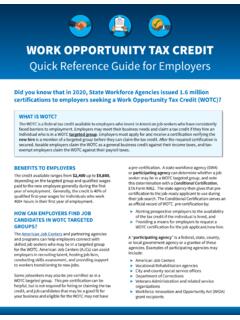Transcription of HIRING PEOPLE WITH CRIMINAL RECORDS: AN EMPLOYERS’ …
1 HIRING PEOPLE WITH CRIMINAL RECORDS: AN EMPLOYERS' guide TO YOUR. LEGAL RIGHTS AND RESPONSIBILITIES IN MICHIGAN. What Questions can I Ask a Job Applicant? You can ask whether an applicant has been convicted of a crime, and, if so, when, where and the nature of the offense. You may also ask if the applicant has any pending felony charges. However, you may not ask about arrests whether for felonies or misdemeanors that did not result in conviction. In some cases, applicants have had their records sealed, meaning that the applicant's record is not available to the public. You cannot ask about sealed records. At What Point in the HIRING Process Can I Ask About an Applicant's CRIMINAL History? Legally, you can ask about an applicant's record at any point in the HIRING process. Although employment practices vary, it is becoming more common to wait until the end of the HIRING process, and then make an offer contingent upon clearing a background check. This allows the employer to identify the best possible candidate for the job, and then determine whether that person's record, if any, is relevant to the position in question.
2 Do I Need the Applicant's Permission to Do a Background Check? Yes, in most cases. CRIMINAL record checks are covered by the Fair Credit Reporting Act, which requires written consent of the job applicant. Although there are some situations where consent may not be required, to protect your company you should always get written permission before doing a check. How Accurate are CRIMINAL Background Checks? CRIMINAL background checks are tremendously unreliable. Because record matches are often based on little more than a name match, and because offenders frequently use aliases, it is very common for a background check to show a record when the applicant does not have one, or for a check to show no record when an applicant does have one. Many records do not contain up-to-date information, so that a case may appear open when it is in fact closed. Reports frequently show the same conviction multiple times, making it appear that an individual has multiple convictions.
3 Conviction information is often simply wrong. Never rely on a CRIMINAL background check without talking to the job applicant first. 1. The Job Applicant Claims the Record Does Not Belong to Him or Her. What Do I. Do Now? Contact the background check company and ask them to recheck the information provided. You can also check with the courts directly, since court records are more accurate than those provided by background check companies. If there is a match on the name, check whether other data such as date of birth and social security number also match. In addition you should always give applicants the opportunity to prove that the record does not belong to them. Advise the applicant that to contact the background check company about correcting the record. More information about correcting errors on records is available at: I Don't Understand the Background Check Report. How Do I Read this Thing? Background check reports can be confusing to read.
4 Moreover each court system in the country has different practices, and each background check company reports this information in a different way. To minimize confusion, it is a good idea to centralize the background check process, so that the person responsible for reading reports can learn how to read them correctly. If you are working with a service agency that places PEOPLE with CRIMINAL records, that agency can help you understand the applicant's record. You can also ask the background screening company, the courts, or the job applicant for help in interpreting what the report means. I am Planning to Deny Employment Based on the Applicant's CRIMINAL Record. Do I Need to Give the Applicant a Copy of the Background Check Report Beforehand? Yes. If you are planning to make an adverse employment decision, such as denying employment or terminating an employee, based on CRIMINAL record information provided, you must provide a copy of the report to the job applicant before making that decision.
5 This requirement is designed to allow job seekers to address any errors in the report. In addition, it gives you an opportunity to talk with the applicant about whether the applicant would be a good employee despite having a record. I've Used a Background Check to Deny Employment or to Terminate an Employee. What Do I Do Now? After making a decision based on a commercially prepared background report, you must provide the name, address and phone number of the credit reporting agency that provided the report. You must also provide a copy of the Federal Trade Commission's Summary of Consumer Rights, which explains to applicants how they can dispute the completeness or accuracy of the report with the background check company. You can get a copy of the Summary of Consumer Rights from the company that prepared the background check. 2. With Whom Should I Share Information about an Employee's CRIMINAL Record? CRIMINAL record information is highly sensitive, and should be shared only with those in the company who have a legitimate business reason to know that information.
6 In addition, the Fair Credit Reporting Act, which covers background check reports, allows employers to get such reports only for employment purposes. To avoid liability for misuse of background check reports, you should limit access to employees' CRIMINAL record information. My Company Won't Hire Anyone with a Felony. Is that Legal? In most cases, no. In some industries there are laws that prohibit you from HIRING certain individuals with CRIMINAL records. However, unless your company is required by law not to hire PEOPLE with felony convictions, you should not have a policy against HIRING this population. Because policies prohibiting the employment of PEOPLE with CRIMINAL records have an adverse impact on PEOPLE of color, such policies can violate anti-discrimination laws. The Equal Employment Opportunity Commission recommends that employers consider the nature and gravity of the offense, the time since conviction, and the nature of the employment tasks before disqualifying an individual from employment based on CRIMINAL background.
7 How Do I Protect My Company Against Claims that We Discriminate Against PEOPLE with Records? Employers who have a no-felon policy may be the target of discrimination lawsuits. To help protect your company, you should adopt a policy that looks at factors like the length of time since conviction, circumstances of the offense, number of convictions, employment record since conviction, rehabilitation, and nature of the job. You may want to ask only about more recent convictions, more serious convictions, or convictions related to the job for which they are being considered. In cases where you deny employment based on a person's CRIMINAL record, you may want to document that you have considered the factors listed above. I Need to Fire Someone Who Has a CRIMINAL Record. How Do I Avoid a Discrimination Claim? As in any case where you terminate an employee, you should document the basis for the termination. Because of equal opportunity laws, it can be illegal to fire someone simply because they have a CRIMINAL record.
8 However, if an employee's job performance is unsatisfactory, there is nothing illegal about terminating that employee just because that employee has a CRIMINAL record. 3. What If the Law Says I Can't Hire PEOPLE with Records? There are some industries particularly long-term care, education, childcare and transportation where there are laws and regulations disqualifying some PEOPLE with records from working in that industry. These rules are often very complicated, and may include exceptions for PEOPLE with a work history in the field, or may allow for an appeals process. Make sure that your human resources office understands exactly who is and is not eligible to work in your company. For more information about the rules in particular industries, go to: Should I be Concerned About Negligent HIRING Lawsuits? If an individual is being hired for a position that does not involve contact with the public such as production work negligent HIRING is generally not an issue.
9 If the position does involve contact with the public, the courts have made it clear that the mere fact that an employee has a CRIMINAL record does not establish a claim for negligent hire. Rather, the question is whether the employer used reasonable care in HIRING . You can help protect your company by adopting a policy of considering convictions on a case-by-case basis. If you conduct CRIMINAL background checks, it is important to document that you have reviewed the results prior to hire, and have concluded that the applicant is an appropriate hire for the position in question. Documenting reference checks is also helpful. Will My Insurance Rates Increase if I Hire Individuals with CRIMINAL Records? Insurance companies do not typically request this type of disclosure regarding employees, and therefore, it should not increase your rates. Insurance companies typically rate based on claims information. Can I Get Free Federal Bonding for Employees with CRIMINAL Records?
10 Yes. Under the Fidelity Bonding Program, the federal government will issue free business insurance coverage against theft if you hire a job applicant with a CRIMINAL record. Bonds can be obtained instantly, and last for six months. For more information, go to , or call 1-888-235-6855. Can I Get a Tax Credit for HIRING a Person with a CRIMINAL Record? Yes. The Federal Work Opportunity Tax Credit provides up to $2400 in tax credits if you hire an individual who was convicted of a felony or released from incarceration within one year of the hire date. You may also be eligible for a tax credit for individuals with older convictions, if those applicants fall into one of the other tax credit target groups, such as welfare recipients or veterans on food stamps. If you hire an individual with a record who was also a long-term welfare recipient, you could receive up to $8500. in tax credits over two years. For more information, call 1-800-482-2959. 4. Can My Employees Get Their Records Sealed?

